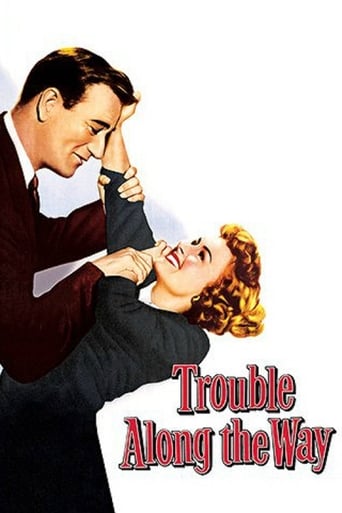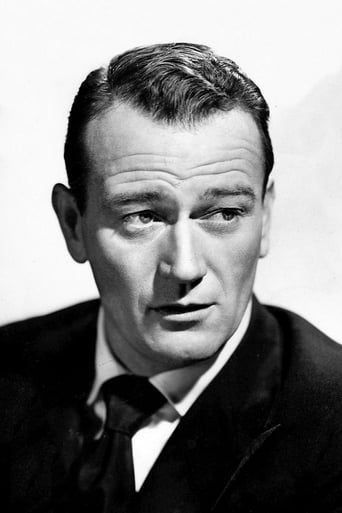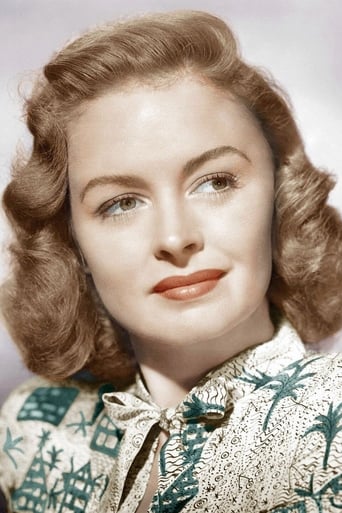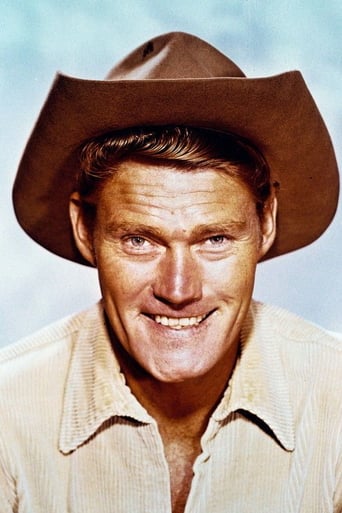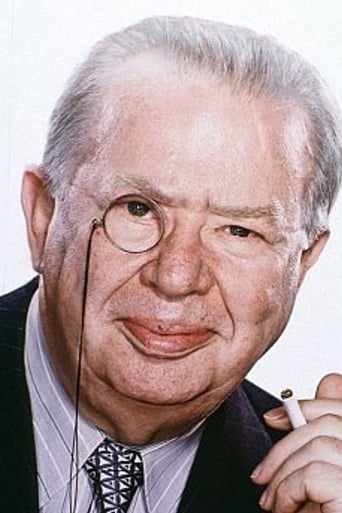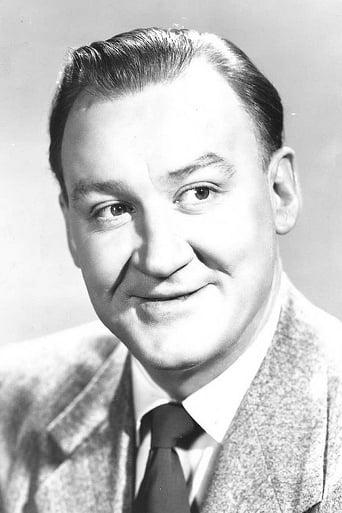SimonJack
This is one of the six dozen non-western movies John Wayne made in his 50-year screen career. It's a good drama with comedy spread throughout, and a little romance. The Duke was in familiar territory besides his acting here, where he plays a football coach. He had been a star high school football player and had a scholarship for football at the University of Southern California (USC). Wayne has a good role as a single father, Steve Williams, raising daughter Carol, played by Sherry Jackson. Unfortunately, for him, the child welfare officer, Alice Singleton (played by Donna Reed) doesn't think pool rooms and athletic events are the best place to raise an 11- year old girl. Of course, she doesn't know the background of Carol's mother who was unfaithful to Steve and who wanted nothing to do with her daughter. Marie Windsor plays the bitter former wife, Anne McCormick, who lives a life of parties with her second husband. It's Anne who complained to the child welfare people that Steve was unfit as a father. We don't ever learn the reasons why in this movie, but Steve had been banned from coaching in major football leagues, including the Big Ten and Ivy League. He had been one of the best coaches in college ball. But he gets another chance with a small independent Catholic college, St. Anthony. The rector, Father Burke (played superbly by Charles Coburn), is desperate to find a way for the school to raise money to pay off its debt so it can remain open. Naturally, he thinks of a successful football program as the way to do that. But who and how to get the right man to pull it off?That's how Steve winds up at St. Anthony. The rest of the story blossoms from there. Other reviewers talk about the condition of college and professional sports at the time. The film has that, but it's incidental to the main double story. That is the single dad raising his daughter, and the small college surviving. This is a good story and an entertaining film that most should enjoy. I especially like the ending, which leaves it to the viewers' imagination as to how the characters will fare in the future. The acting is very good all around. Wayne showed in this and many other films that he could act and do more than brawl and shoot 'em up in Westerns. Although, it's hard to pass on a good John Wayne Western for entertainment. On a point of trivia – other reviewers have commented on the quote that Carol uses in the film, when she says what Steve's philosophy is: "Winning isn't everything, it's the only thing." People well into the 21st century may not know about that remark or its attribution during the last of the 20th century to legendary pro football coach, Vince Lombardi. The first recorded instance of Lombardi saying something like that was 1959. But this movie was made in 1953. And, as others have noted, the real source of the quote was UCLA Bruins Coach Henry "Red" Sanders. Sanders said something like it in 1950, and the Los Angeles Herald and Express ran it as a subhead in a story about Sanders on Dec. 7, 1953. A former sports writer for the paper, Bud Furillo, said that he first heard Sanders say it after UCLA lost its game to USC in 1949. No doubt the writers for this movie remembered having read or heard the phrase, so they included it in the screenplay for "Trouble Along the Way."The IMDb Web site shows 178 listings of John Wayne appearances in movies and TV shows. Of that number, six were TV shows, five were shorts and 167 were full-length movies. Wayne was uncredited in 24 of the 178 appearances – on one TV show, two shorts and 21 full-length movies. Of the remaining 146 full-length films, he either starred or co-starred in 142 of them. About half of his films were Westerns, the next largest genre was war and military films (about 2 dozen), then action/adventure, crime-mystery, comedy-romance, and drama.Here are some samples of the light humor in this movie. Carol, "Steve, why don't we go to a ballgame?" Steve, "When did you burn down the school?" Carol, "Okay. But, I'm only doing this for you." Steve, "Thanks, pal."Steve, "I hope you can sleep with all those bells." Carol, "I can always bang my head against the wall."Steve, "Care for a cigarette?" Alice, "No thank you." Steve, "It's the kind all the doctors smoke."Steve, "You just gotta quit looking at me like I was George Washington and Babe Ruth and Florence Nightingale all rolled into one."Father Burke, "Is there a Bible in the house or do you have to go to a hotel?"Steve, "Well, the trouble with us, father, is I'm a sensitive man and you're a gambler."Coach Buck Holman, "Are you of a forgiving nature?" Father Burke, "Well, I'm in that business."Steve, "I got something for you." Carol, "What's in this?" Steve, "A time bomb, what else? Open it and blow us all up."
Jay Raskin
This movie mixes two genres. First, there's the sports story genre with a has been coach making a come-back with a loser team. Second, there's the single, loving father trying to prove he's a good parent and hold onto his child. In a way, we're getting two movies in one. Both of them are fine and are mildly entertaining.The sports story and the coach character isn't far from the usual John Wayne Cowboy/Military officer role. He is quite effective in this. However as the father, in the family story, he is cool when he should be warm and he hardly registers much emotion when he realizes he might lose her. This is a part that Cary Grant would have been perfect for.Adorable Sherry Jackson as the daughter is a lot of fun and it is easy to see why she got her long running television series with Danny Thomas. Donna Reed gives an extraordinary intelligent performance as the social worker trying to protect Jackson. It is also easy to see why she also starred in a long running television series five years later.The setting of the movie at a small Catholic College is probably a mistake. There is just not that much humor there. Probably because the censorship office was controlled by Catholics, there was a limit on how much you could let the audience laugh at the priests. Director Curtiz does come as close to that limit as any movie of the time.The best scene is when Wayne finds out that the football schedule for the team he has just taken over includes the toughest teams in college football. Here, Wayne lets himself go and actually registers a new emotion for him - fear.The sexual politics in the movie is so frightening and bizarre, I don't even want to analyze it. I'll just say that at one point Wayne suddenly grabs Reed against her will and forcibly kisses her, although she has not shown the slightest interest in him before this point. He tells her that this is what she really wants and finally she admits it. One has to cringe for her and all women who had to live in the 1950's.I think if this film had been more successful, Wayne would have broken away from the cowboy/military stereotypes and done some interesting movies in the last two decades of his life. Unfortunately, the movie wasn't that successful and he went back to the safe stereotypical tough as nails roles.
kevin-1812
Picture a "Cary Grant" style script but take it from the French Riviera and put it in urban New York! The "Grant" staple of high intrigue, beautiful scenery, and opulent subject matter is replaced with dirty streets, pool parlors, and a crooked football team but the dialogue and pacing are still there. Now throw in John Wayne is the seedy football coach who has been thrown out of the "legitamate" football leagues, Charles Coburn is the desperate head priest of a failing college, and Donna Reed is a tunnel visioned "do-gooder" cop. Reed wants to protect Wayne's daughter Sherry Jackson from his unhealthy influence and is sympathetic to Marie Windsor's (ex-wife from hell) claim that her daughter (Jackson) needs to be with her (even though she had abandoned Jackson as an infant when she ran off with another man). Wayne feels he's done nothing wrong but sees that antagonizing Reed is a mistake and takes the job of head coach at Coburn's St. Anthony's college as "cover" to clean up his image. Wayne realizes that if he wheels and deals under the table he can achieve Coburn's goal of making St. Anthony's a winning team and make a fortune for himself and his cohorts (including Chuck Conners in an early role). Wayne pulls in favors, blackmails everyone who doesn't play along, and deceives his benefactors to get a major schedule and almost succeeds. The conclusion of the film is thoroughly satisfying with Richard Garrick as the judge presiding over the case. Wayne takes over in true streetwise "Grant" style and is hilarious to the point that Reed asks the judge "Can I get a word in?" and Garrick resigns himself to say, "Ask him, I lost control of this trial a long time ago". The opposing attorney makes the comment "I could have been trying a murder case this week" and Garrick says, "Hang in there, you might still be". When Reed is asked by the opposing attorney if she loves Wayne, Wayne jumps up and tells the judge, "Remind the witness she's under oath!" Charles Coburn makes a wonderful speech at the end and reminds us of how good an actor he was. This is not John Ford's movie, this is Michael Curtiz' movie and it makes me wonder how much more Wayne had to offer in this genre (we would get a hint of it in "McLintock" and "North to Alaska"). The supporting cast is superb with the likes of Tom Tully and Dabbs Greer. Everyone does a great job and I place this at the top of my John Wayne list of films. Don't miss it.
